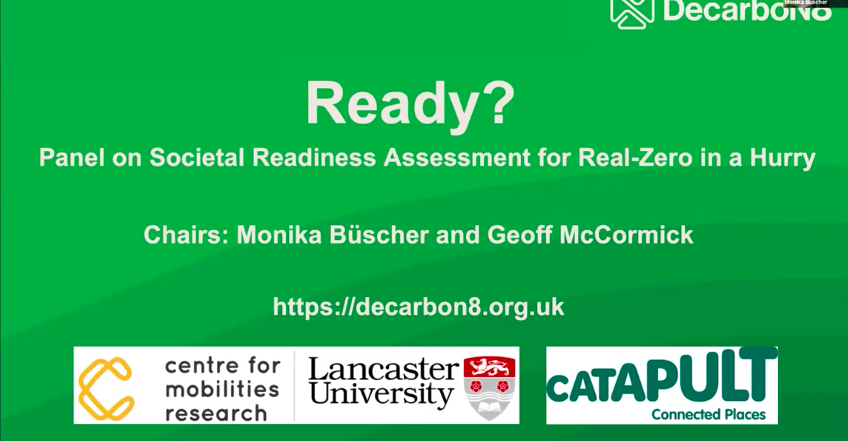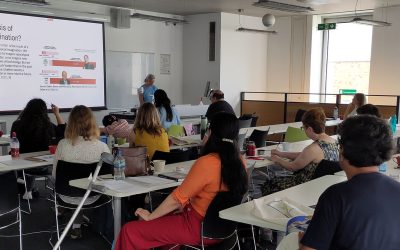In this post, Cron Cronshaw, who spoke at the DecarboN8 ‘Real Zero in a Hurry’ conference, reflects on the Societal Readiness Panel.
The Societal Readiness Assessment (SoRA) panel at the Decarbon8 ‘Real Zero in a Hurry’ conference provided an excellent opportunity to delineate, develop, and discuss the SoRA framework with a live audience and representatives from The Yorkshire and Humber Youth Work Unit, Connected Places Catapult, and the Zero Carbon Cumbria Partnership.
We need to reduce carbon emissions, and the societal readiness framework will make a valuable contribution to securing a more sustainable future.
So, how can we ensure everyone develops an unwavering “comic faith in technofixes” (Haraway, 2016)? How can we make certain everyone purchases the latest decarbonising technologies? How can we make sure everyone adopts whatever new initiative ‘the experts’ come up with? I don’t know. That’s not what societal readiness is about – although you could be forgiven for thinking otherwise – especially because societal readiness is an emerging, already contested, concept.
Sometimes, societal readiness assessment is presented as a means of gauging how ready society is to embrace new ideas and products; a preliminary step in determining how best to stimulate maximum uptake of innovations. Conversely, the DecarboN8 version of societal readiness champions probing how ready decarbonising interventions (technology/policy/innovation/scheme) are for society.
Citizens deserve the chance to play an active role in shaping the technologies, policies, and schemes that will help us reach Net Zero and the DecarboN8 SoRA framework is methodology attuned to this need, as it offers a formative, collaborative means of evaluating decarbonising initiatives. Furthermore, SoRA offers a necessary counter to prescriptive solutionism by placing issues of mobility justice (Sheller, 2018) and response-ability (Haraway, 2016) at the fore.
Innovation doesn’t occur in a vacuum – design, production and dissemination are inextricably entangled with issues of power, equality, and access. Accordingly, societal readiness assessment offers a means of scoring a decarbonising intervention in terms of social good, equity, and utility. Additionally, evaluations are iteratively undertaken with stakeholders throughout the lifespan of a project so that many people (not only anticipated users and customers) play a part in influencing every stage of design.
It’s important to emphasise that collective development extends to SoRA too. Since its conception (Büscher and Spurling, 2019), the framework has been designed in partnership with a stakeholder reference group and repeatedly restyled following trials with various collaborators. Continuing in this vein, the panel provided an opportunity for stakeholders, including the conference attendees, to critique the SoRA framework and share their SoRA analyses of other ideas presented at the event: Check out the results here!
It’s difficult to summarise a panel that covered so much – the best thing to do is to encourage you to watch the video and see for yourself! You’ll be able to hear about how SoRA has been used to evaluate an e-scooter trial, why SoRA is important for young people, how SoRA could be used in tandem with Technology Readiness Assessment, and the potential for SoRA to work in conjunction with an initiative like HUB-IN (Hubs of Innovation and Entrepreneurship for the Transformation of Historic Urban Areas), which focusses on innovating in historic urban areas whilst maintaining the unique identity of the locale.
Watch the video here: https://youtu.be/WH3fy2WNer0
Please get in touch if you’d like to share your thoughts, ask questions, or collaborate in some way:




